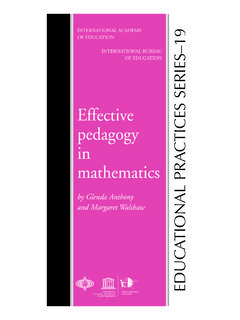Transcription of THE ONTARIO CURRICULUM GRADES 1 8
1 THE ONTARIO CURRICULUM GRADES 1 8 mathematics 2020 The ONTARIO Public Service endeavours to demonstrate leadership with respect to accessibility in ONTARIO . Our goal is to ensure that ONTARIO government services, products, and facilities are accessible to all our employees and to all members of the public we serve. This document, or the information that it contains, is available, on request, in alternative formats. Please forward all requests for alternative formats to ServiceOntario at 1-800-668-9938 (TTY: 1-800-268-7095). Queen s Printer for ONTARIO , 2020 PDF versions of a CURRICULUM include the following information from the CURRICULUM and Resources website: the Program Planning and Assessment and Evaluation sections of the CURRICULUM and Resourceswebsite that apply to all ONTARIO CURRICULUM , GRADES 1 12; the CURRICULUM Context that is specific to a discipline; the strands of the CURRICULUM ; and glossaries and appendices as ONTARIO CURRICULUM GRADES 1 8: mathematics , 2020 Last issued: August 2020 This CURRICULUM policy replaces The ONTARIO CURRICULUM , GRADES 1 8: mathematics , 2005.
2 Beginning in September 2020, all mathematics programs for GRADES 1 to 8 will be based on the expectations outlined in this CURRICULUM policy . Version History: Version Date Description June 23, 2020 Revised CURRICULUM released August 21, 2020 Glossary and key concepts added Program Planning and Assessment and Evaluation Content Last updated: June 2020 This content is part of official issued CURRICULUM providing the most up-to-date information ( , front matter). This content is applicable to all CURRICULUM documents, GRADES 1 to 12. Educators must consider this information to guide the implementation of CURRICULUM and in creating the environment in which it is taught. January 18, 2021 Minor corrections and edits to existing content Contents Considerations for program Introduction.
3 6 Student Well-Being and Mental Health ..6 Instructional Approaches ..8 Planning for Students with Special Education Planning for English Language Healthy Human Rights, Equity, and Inclusive Education ..18 The Role of the School Library ..20 The Role of Information and Communications Education and Career/Life Experiential Pathways to a Specialist High Skills Major (SHSM)..24 Health and Safety ..24 Ethics ..26 Cross-curricular and integrated learning ..27 Introduction ..27 Integrated Financial STEM Education ..29 Indigenous Critical Thinking and Critical Literacy ..32 Mathematical Environmental Education ..35 Social-Emotional Learning Skills ..36 Transferable skills ..38 Introduction.
4 38 Critical Thinking and Problem Solving ..39 Innovation, Creativity, and Self-Directed Communication ..42 Global Citizenship and Sustainability ..42 3 Digital Assessment and Evaluation ..45 Introduction ..45 Fundamental Learning Skills and Work Habits ..46 Content Standards and Performance Assessment "for Learning" and "as Learning"..47 Reporting Student Achievement ..49 Categories of Knowledge and Criteria and Descriptors ..50 Levels of Achievement ..51 Sample Achievement Charts ..52 CURRICULUM context ..62 Preface ..62 Vision and Goals ..62 The Importance and Beauty of Principles Underlying the ONTARIO mathematics CURRICULUM .
5 65 Roles and Responsibilities in mathematics Education ..67 The Program in The Mathematical Processes ..73 The Strands in the mathematics CURRICULUM ..78 Some Considerations for Program Planning in mathematics ..90 Cross-Curricular and Integrated Learning in mathematics ..100 Assessment and Evaluation of Student mathematics , Grade 1 ..110 mathematics , Grade 2 ..141 mathematics , Grade 3 ..176 mathematics , Grade 4 ..221 mathematics , Grade 5 ..268 mathematics , Grade 6 ..325 mathematics , Grade 7 ..384 mathematics , Grade 8 ..443 Glossary ..500 4 Une publication quivalente est disponible en fran ais sous le titre suivant : Le urri ulum de l OntIJrio de lIJ 1re ij lIJ 8e ann e Math matiques, 2020.
6 5 Considerations for program planning Introduction ONTARIO elementary and secondary schools strive to support high-quality learning and student well-being. Schools give individual students the opportunity to learn in ways t hat are best suited to their individual strengths and needs. A t the secondary level, students ability to thrive academically and personally is also supported b y their ability to choose courses and programs that best suit their skills, interests, and preferred postsecondary destinations. Educators plan teaching and learning in every subject and discipline so that the various needs of all students are addressed and so that students can see themselves reflected in classroom resources and activities.
7 This section highlights the key strategies and policies that educators and school leaders consider as they plan effective and inclusive programs for all students. Student Well-Being and Mental Health Promoting the healthy development of all students, as well as enabling all students to reach their full potential, is a priority for educators across ONTARIO . Students health and well-being contribute to their ability to learn in all disciplines, and that learning in turn contributes to their overall well-being. A well-rounded educational experience prioritizes well-being and academic success for all students by promoting physical and mental health, social-emotional learning, and inclusion. Parents, community partners, and educators all play critical roles in creating this educational experience.
8 Educators support the well-being of children and youth by creating, fostering, and sustaining a learning environment that is healthy, caring, safe, inclusive, and accepting. A learning environment of this kind supports not only st udents cognitive, emotional, social, and physical development but also their sense of self and/or spirit, their mental health, their resilience, and their overall state of well-being. All this will help them achieve their full potential in school and in life. A variety of factors, known as determinants of health , have been shown to affect a person s overall state of well-being. Some of these are income, education and literacy, gender and culture, physical and social environment, personal health practices and coping skills, and availability of health services.
9 Together, these factors influence not only w hether individuals are physically h ealthy but also the extent to which they will have the physical, social, and personal 6 resources needed to cope and to identify and achieve personal aspirations. These factors also have an impact on student learning, and it is important to be aware of them as factors contributing to a student s performance and well-being. An educator s awareness of and responsiveness to students cognitive, emotional, social, and physical development, and to their sense of self and/or spirit, is critical to their success in school.
10 A number of research-based frameworks, including those described in Early Learning for Every Child Today: A Framework for ONTARIO Early Childhood Settings, 2007, On My Way: A Guide to Support Middle Years Childhood Development, 2017, and Stepping Stones: A Resource on Youth Development, 2012, identify developmental stages that are common to the majority of students from Kindergarten to Grade 12. At the same time, these frameworks recognize that individual differences, as well as differences in life experiences and exposure to opportunities, can affect development, and that developmental events are not specifically age dependent. The framework described in Stepping Stones is based on a model that illustrates the complexity of human development.










